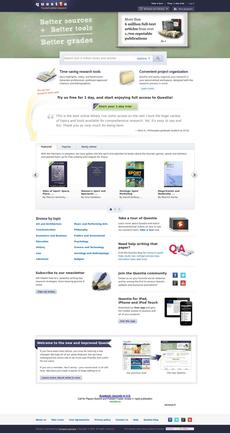Service
Questia offered some information free of charge, including several public domain works, publication information, tables of contents, the first page of every chapter, Boolean searches of the contents of the library, and short bibliographies of available books and articles on some 6,500 topics.
Questia did not sell ownership to books or ebooks, but rather sold monthly or annual subscriptions that allowed temporary online reading access to all 94000+ books, and 14 million + journal, magazine, and newspaper articles in their collection. The books were selected by academic librarians as credible, authoritative works in their respective areas. The librarians also compiled about 7000 reference bibliographies on frequently researched topics. The library was strongest in books and journal articles in the social sciences and humanities, with many older historical texts. Original pagination was maintained. The Questia service also featured tools to automatically create citations and bibliographies, helping writers to properly cite the materials.
A limitation to the Questia library was that new additions were available in a "beta" version only. Unlike Questia's earlier publications, these prevented users from copying text directly from the website, although one page from the publications could be printed free of charge. A charge was made for printing a range of pages.
Questia launched their Q&A blog on September 21, 2011. [4] Q&A was divided into "Education news", "Student resources" and "Subjects" categories. "Subjects" was further broken down so readers could find specific content based on their academic needs. [5]
Questia released an iPhone app in 2011, which was extended to the iPad the following year. [6] Then in January 2013 Questia launched tutorials, including videos and quizzes, to teach students the research process. [7]
This page is based on this
Wikipedia article Text is available under the
CC BY-SA 4.0 license; additional terms may apply.
Images, videos and audio are available under their respective licenses.


